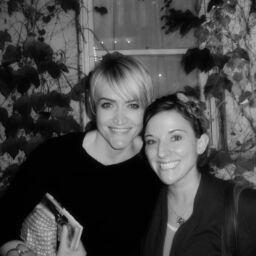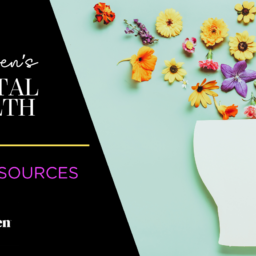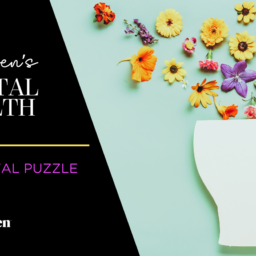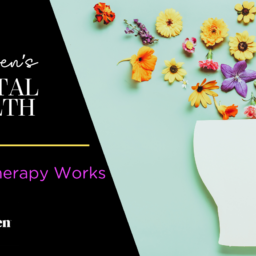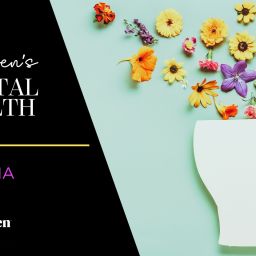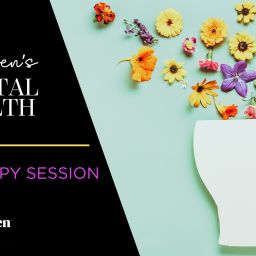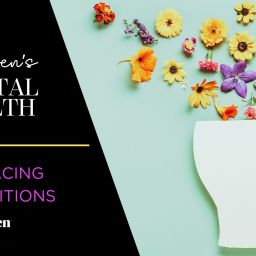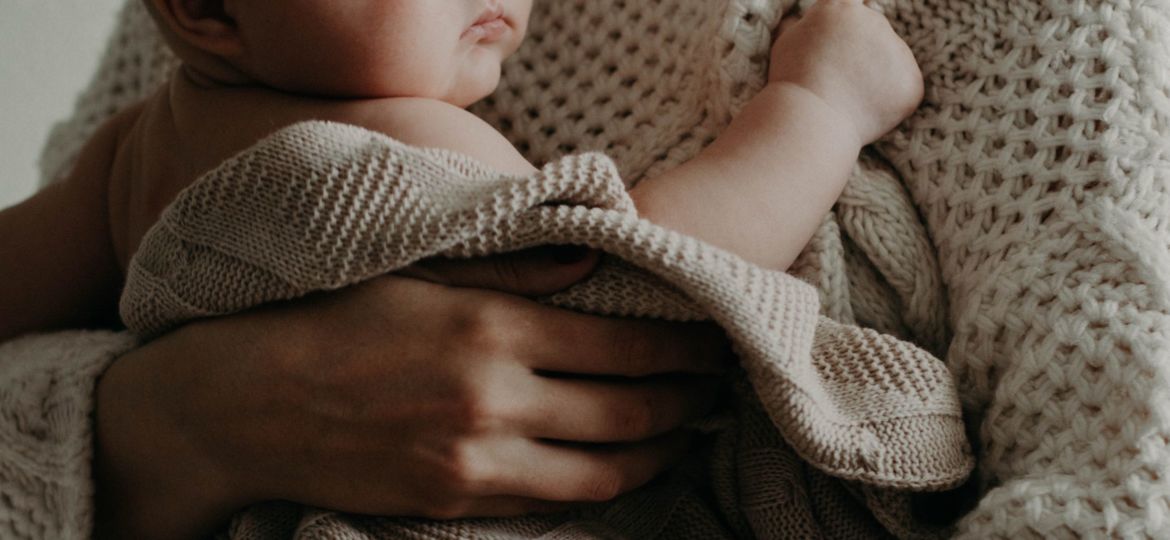

Peyton Griggs was sitting on her sofa and studying while six-month-old Emmett cried on the floor when her partner, Nick, came home. Nick asked why Emmett was crying, and Griggs recalls saying, “I think he’s hungry,” as she continued to sit and work. In disbelief at her answer, Nick asked if she was going to feed him.
While she was generally aware that things weren’t going great since Emmett’s birth, it was in that moment that Griggs realized she needed help. “I remember realizing … I was completely apathetic,” she shares, while in the background the noises of active children present an appropriate soundtrack to her story. After receiving a diagnosis of Postpartum Depression (PPD), trying medication, and ultimately weaning Emmett, Griggs started to come out of the fog so frequently described by parents with PPD.
Perinatal Mood and Anxiety Disorders: Not Your Mother’s Postpartum Depression

Postpartum depression is widely recognized. Many OBGYN and primary care practices incorporate questionnaires to screen for the condition. Maria P. Hanzlik, PsyD, HSPP, PMH-C, a clinical psychologist who is certified in perinatal mental health and is also an AASECT-certified sex therapist, the owner of the Integrated Psychological Center of Indiana, and a mother to three children, shares: “Although PPD, or postpartum depression, is more commonly known, the field has shifted to use the acronym PMAD which stands for Perinatal Mood and Anxiety Disorders. This term more accurately accounts for the wide range of mental health conditions that can show up both in pregnancy and in the postpartum period, or the first year after giving birth. Some of these conditions include depression, bipolar disorder, generalized anxiety disorder, panic disorder, obsessive-compulsive disorder, posttraumatic stress disorder, and psychosis.”
One in eight women report symptoms of depression after giving birth, with one in five reporting that they were asked about symptoms by a healthcare provider, according to the Centers for Disease Control and Prevention (CDC). Dr. Lindsay Moore-Ostby, MD, IBCLC, an Indianapolis-based primary care physician who includes breastfeeding and postpartum care in her specialty areas remembers: “After a difficult birth with my first child, I found myself in the middle of a ‘lactastrophe’ when breastfeeding didn’t go well. I was shocked at how ill-prepared I was for breastfeeding and postpartum despite my experience as a pediatrician and primary care physician. Even with a good care team supporting me, I couldn’t find the care I needed for our complicated breastfeeding difficulties, as there was no physician in the area specializing in that field. I became severely sleep deprived and felt very alone.”
After Diagnosis Comes Treatment. Right?
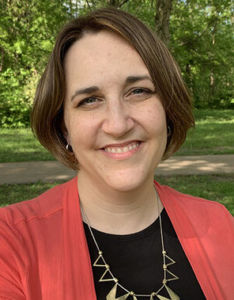
Even with so many women reporting symptoms of depression postpartum, and with some healthcare providers increasing perinatal screenings in recent years, research shows that 50 percent of women with symptoms never receive treatment. Dr. Moore–Otsby adds that it was much later that she realized her difficulties extended beyond a difficult lactation and recovery experience. “It also surprised me that no one directly said to me that I was suffering from PPD/PPA. No one directly addressed that issue and made sure I sought the appropriate care. I have now seen with patients that this often happens, even when others around the parent are concerned about their mental health. PPD/PPA so often goes unrecognized or unconfronted, with people circling around the underlying problem instead of addressing it head-on.”
Risk Factors to Consider
That emotional toll of pregnancy, childbirth, and the postpartum period are difficult under the best of circumstances. For those women with a family or personal history of depression, anxiety, OCD, or bipolar disorder, the risk of developing a postpartum mental health condition is higher, says Dr. Hanzlik. The National Child And Maternal Health Education Program cites environmental and social factors as risks as well. These factors can include lack of support from family or partners, financial problems, an ongoing global pandemic, and general disregard for women’s bodily autonomy. Giving birth to multiples, a difficult pregnancy, a traumatic birth experience, and an unplanned or unwanted pregnancy can increase the risk as well.
The COVID-19 pandemic played a part in Liz Wertz’s experience. The Indy resident and full-time working mom of two recalls: “After having my son in May of 2020, it took me a few months — I didn’t start taking meds until October 2020 — to realize I was experiencing PPD. I kept gaslighting myself and telling myself, ‘It’s not a big deal, I’m just feeling off because of COVID, being a parent of two kids, normal newborn exhaustion/schedule.’ But, unlike with my first, I was experiencing symptoms that actually interfered with my day. I had ZERO energy; all I wanted to do was lay in bed all day long. My patience was extremely short, which mostly affected how I interacted with my husband and older toddler. I’d snap at them for seemingly no reason, and then spend hours feeling guilty and ashamed of my behavior. I talked to a moms group I’m a part of and also my husband, and everyone suggested reaching out to my OBGYN about meds.”
Wertz, Griggs, and Dr. Moore-Otsby were lucky to have access to support and resources for their diagnoses and treatments, but a lack of treatment for PMAD can have dire consequences for maternal and infant outcomes.
Surprising Experiences
Mental health is often still stigmatized in the U.S., and while our culture continues to make progress toward normalizing mental health needs, a gap exists. Wertz shares that she was surprised to still feel a little embarrassed when letting others know that she was taking medication for her postpartum diagnosis. “I’m very pro-mental health and am vocal about my five-plus years in therapy, but for some reason, it still felt taboo to need help for PPD. I was really nervous if I told people, they’d assume I hated my kids or wanted to hurt them, which was never the case.”
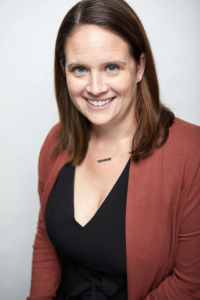
“Many parents are concerned that someone will think they are a bad parent and take the baby away. I often reassure families that we will support them and come up with a safety plan to make sure they can get the help they need,” affirms Sabrina White, a board-certified psychiatric nurse practitioner and mom of two. White’s interest in supporting new mothers stems from her experience with her own son, Charlie. Charlie was born prematurely at 29 weeks gestation, and even with a strong support system and flexible time off from employers, White experienced a lot of emotions and anxiety.
Dr. Moore-Otsby explains that a postpartum disorder may not always present as sadness or crying. People may be surprised at how quiet the symptoms can be. Anxiety or worries about an infant’s health or how breastfeeding is going may be dismissed by well-meaning friends and family who want to comfort a parent with an infant. Grigg’s experience echoes this. She was surprised by how often people dismissed her experiences with, “It’s normal. Babies are hard.”
The Practical Advice
While preventing adequate sleep is considered cruel and unusual punishment, no one bats an eye at the experiences of parents with new (and sometimes not-so-new) babies. A common thread running through most of the advice to combat PMADs is ensuring adequate sleep. Dr. Hanzlik adds that eating well and staying hydrated should be part of the basic care for birthing parents. Seems simple enough, but we routinely underestimate the magnitude of the impact a new baby makes.
How can you support yourself or someone you care for who may be going through a perinatal mood or anxiety disorder? The good news is, there are big and small ways to help.
Provide support in the form of meals, doing the dishes, or taking care of laundry. These are tasks that can often feel overwhelming. Dr. Moore-Otsby advises: “Don’t just come and hold the baby.” Ask how they’re doing. Ask about their experiences with “worries, anxieties, fears, loneliness, guilt, physical recovery, [and] sadness.”
Dr. Hanzlik observes, “The experiences of new mothers and parents are often overshadowed by the entrance of babies into the world, as exciting and joyful as that can be.” She acknowledges that even though it’s often a joyous time, pregnancy and postpartum can be incredibly isolating.
Dr. Moore-Otsby agrees and adds: “The isolation of postpartum in our culture has been compounded during the past two years with the COVID-19 pandemic. Our culture already tends to isolate postpartum families, with others often focusing on coming to visit the baby or focusing on how fast they ‘bounce back’ and return to work, instead of surrounding them with the support for day-to-day care that they really need.”
Connecting with impactful resources for support with PMAD is another option for help. Postpartum Support International (PSI) provides support groups and access to local volunteers across its chapters. PSI works to “reduce stigma, increase awareness, and provide connections to resources.” Other resources PSI provides include training for healthcare professionals, coaching for support group leaders, and hotlines in both English and Spanish.
Birthing a child is a life-changing event that brings joy, pain, and everything in between. While “Baby Blues” may be expected, if you or someone you know can benefit from additional support, don’t wait. As Griggs’ middle child, Marshall, comes up for cuddles, she emphasizes: “Surround yourself with people who are okay with you not being okay. You deserve to have a support system who doesn’t just support you on the good days.”
If you or someone you know is struggling or in crisis, help is available. Call or text 988 or chat 988lifeline.org.
The terms male/female and man/woman in this article refer to all those who identify as such, not dependent on chromosomes or genitals.
Una Hartzell-Baird (she/her) was voted most likely to be the person who chats you up in the grocery line. She’s an avid reader and a fierce lover of vulgar words. You can find her on LinkedIn and Facebook.
All of our content—including this article—is completely free. However, we’d love if you would please consider supporting our journalism with an Indy Maven membership.













